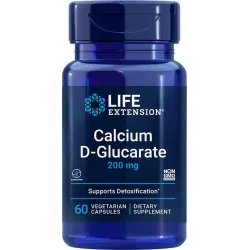Calcium D-glucarate and its effect on the body
Effective detoxification is a key for maintaining good health. Calcium D-glucarate plays a crucial role in the body's proper detoxification process. It inhibits enzymes that reverse detoxification and supports the proper functioning of the detoxification process.
What is calcium D-glucarate and how does it work in the body?
 Calcium D-glucarate is the calcium salt of D-glucaric acid. This acid occurs naturally in small amounts in mammals and in some fruits and vegetables (apples, oranges, grapefruits, and cruciferous vegetables).
Calcium D-glucarate is the calcium salt of D-glucaric acid. This acid occurs naturally in small amounts in mammals and in some fruits and vegetables (apples, oranges, grapefruits, and cruciferous vegetables).
In the body, it releases D-glucaric acid, which is converted into D-glucaro-1,4-lactone, an inhibitor of the beta-glucuronidase enzyme. This supports the removal of hormones (e.g., estrogens) and potentially harmful substances from the body through a process called glucuronidation.
Glucuronidation involves the attachment of glucuronic acid (a glucose derivative) to a target substance (drug, hormone, bilirubin), forming a glucuronide. Glucuronides are typically more water-soluble than their parent compounds, facilitating their excretion from the body through urine or bile.
Through this process, undesirable compounds (drugs, hormones, toxins) become more water-soluble and are more easily excreted from the body, primarily through the kidneys and bile ducts. This is an important mechanism for detoxification and regulation of various substances in the body.
Mechanism of action of D-glucarate:
 Beta-glucuronidase blockade – this enzyme breaks down conjugated compounds (hormones, toxins), allowing them to be reabsorbed. D-glucarate inhibits this reaction, promoting excretion through urine and feces.
Beta-glucuronidase blockade – this enzyme breaks down conjugated compounds (hormones, toxins), allowing them to be reabsorbed. D-glucarate inhibits this reaction, promoting excretion through urine and feces.
- Supporting Phase II liver detoxification – because it is an intermediary in glucuronidation, it facilitates the finalization of metabolic processes, hormones, drugs and toxins.
How calcium D-glucarate affects the body?
 Calcium D-glucarate can affect the body in several ways:
Calcium D-glucarate can affect the body in several ways:
Body detoxification. Suppression of beta-glucuronidase can accelerate the elimination of toxic substances, as demonstrated in animal models. However, human studies are limited.[1]
Cancer prevention. In studies on mice and rats, D-glucarate reduced tumor formation in breast, colon, skin, lung, and liver cancers. [1,17]Initial data in humans are limited and insufficient to support definitive recommendations.
Estrogen hormone regulation. Animal studies have shown a reduction in estradiol levels by approximately 23% at high doses of D-glucarate. [18,19]Some preliminary clinical observations indicate that the combination of DIM + D-glucarate improves estrogen metabolism in women after 28 days. [19] By improving estrogen excretion, D-glucarate may support hormonal balance, which can be helpful in disorders such as PMS and PCOS. Clinical data in this area are preliminary.
Lowering cholesterol levels. Calcium D-glucarate supplementation may be considered to support cardiovascular health, especially in individuals with elevated cholesterol levels. Calcium D-glucarate may contribute to lowering LDL cholesterol (the so-called "bad" cholesterol) and supporting vascular health.[20]
Anti-inflammatory and antioxidant effects. In vitro and animal studies have demonstrated reduced proinflammatory cytokines, increased IL-10, and protection against oxidative stress, for example in diabetic models.[21]
What do animal studies show?

Model studies in rats and mice confirm the potent effects of calcium d-glucarate: a single dose of 4.5 mmol/kg reduced beta-glucuronidase activity in serum by ~57%, in the liver by ~44%, and in the intestine by ~39%.[1,20]
Long-term administration of calcium d-glucarate (4% of the diet) reduced bacterial enzymes in the gastrointestinal tract by up to 70% in the small intestine and 54% in the colon.[1,20]
In a mouse model of skin cancer (DMBA), D-glucarate inhibited tumor growth by affecting key apoptotic mechanisms: it unblocked caspases and inhibited Bcl-2 and mutant-p53, leading to increased tumor cell death.[1,2,20]
In a mouse model of induced lung cancer, D-glucarate administration led to decreased levels of proinflammatory IL-12p70 following exposure to benzo[a]pyrene, increased IL-10, and enhanced tumor cell apoptosis.[1,2,20]
In a rat model of breast cancer, a diet containing calcium d glucarate reduced disease incidence by 18–50%, depending on the phase, increased latency, and reduced tumor number.[1,20]

Those interested in supplementation should consult a doctor, especially when taking medications that are subject to glucuronidation. Glucuronidation affects the pharmacokinetics of drugs, i.e., their absorption, distribution, metabolism, and excretion, which may affect the drug's effectiveness and duration of action.
Calcium D-glucarate should be started at low doses (200-500 mg/day) and reactions monitored.
Pregnant or breastfeeding women, and those with liver or kidney disease should use it with caution.
Summary
 Calcium D-glucarate is a natural supplement that can support the body's detoxification process, supporting liver function and hormonal balance, particularly in the context of estrogen metabolism.
Calcium D-glucarate is a natural supplement that can support the body's detoxification process, supporting liver function and hormonal balance, particularly in the context of estrogen metabolism.
Animal studies have shown promising detoxification, anti-inflammatory, and anti-cancer effects. Furthermore, its effects on hormone metabolism and cholesterol levels in humans also appear promising, although this requires confirmation in larger, controlled clinical trials.
- 1. Walaszek Z. i wsp.,– przegląd działania i potencjału w prewencji nowotworowej PubMed+1Wikipedia+1
- Dwivedi C. i wsp., 1990 – wpływ na beta‑glukuronidazę Integrative Therapeutics®+5douglaslabs.com+5Memorial Sloan Kettering Cancer Center+5
- Heerdt AS. i wsp., 1995 – chemoprewencja raka piersi (badanie na zwierzętach) PubMed+2Memorial Sloan Kettering Cancer Center+2douglaslabs.com+2
- Hanausek M. i wsp., 2004 – hamowanie raka płuc i skóry u myszy Verywell Health+2Memorial Sloan Kettering Cancer Center+2PubMed+2
- Publikacje (Alternative Medicine Review, 2002) – cholesterol, beta‑glukuronidaza, bezpieczeństwo PubMedaltmedrev.com
- Badania kliniczne i przeglądowe z Verywell, WebMD, MSKCC – uwagi o ograniczeniach i braku badań na ludziach Memorial Sloan Kettering Cancer CenterWebMDVerywell Health
- Beta-glucuronidase activity in human serum and its relation to the diet Lampe, J. W., et al. "Beta-glucuronidase activity in human serum and its relation to the diet." Cancer Epidemiology, Biomarkers & Prevention. 2002.
- Glucaro-1,4-lactone inhibits the growth of mammary tumors in rats E. J. S. Saluk-Juszczak, et al. "Glucaro-1,4-lactone inhibits the growth of mammary tumors in rats." Cancer Letters. 2010.
- Calcium D-Glucarate in Cancer Prevention: Mechanistic Insights M. P. S. Hsu, et al. "Calcium D-Glucarate in Cancer Prevention: Mechanistic Insights." PubMed Central.
- Dietary Supplementation with Calcium D-Glucarate Reduces the Incidence of Liver Tumors in Rats W. W. Lee, et al. "Dietary Supplementation with Calcium D-Glucarate Reduces the Incidence of Liver Tumors in Rats." Carcinogenesis. 1999.
- The effect of Calcium D-Glucarate on Chemically Induced Tumors in Mice and Rats C. F. Chen, et al. "The effect of Calcium D-Glucarate on Chemically Induced Tumors in Mice and Rats." Journal of Toxicology and Environmental Health.
- Effect of calcium D-glucarate on beta-glucuronidase in mice and human cells S. S. Lee, et al. "Effect of calcium D-glucarate on beta-glucuronidase in mice and human cells." Pharmacology & Therapeutics.
- Calcium D-glucarate as a preventive agent for cancers of the gastrointestinal tract: Evidence from rodent models J. M. Stern, et al. "Calcium D-glucarate as a preventive agent for cancers of the gastrointestinal tract: Evidence from rodent models." Oncology Research. 2005.
- Calcium D-Glucarate and Cancer Chemoprevention: From Preclinical to Clinical Applications N. A. Galati, et al. "Calcium D-Glucarate and Cancer Chemoprevention: From Preclinical to Clinical Applications." In Cancer Research (2022).
- The Role of Glucuronidation in Hormone Regulation and Its Implications for Cancer T. A. Steger, et al. "The Role of Glucuronidation in Hormone Regulation and Its Implications for Cancer." European Journal of Pharmacology. 2010.
- Calcium D-Glucarate and Prostate Cancer Prevention: A Pilot Study J. M. Wright, et al. "Calcium D-Glucarate and Prostate Cancer Prevention: A Pilot Study." Journal of Urology.
- Kim YS, Milner JA. Dietary modulation of colon cancer risk. J Nutr. 2007 Nov;137(11 Suppl):2576S-2579S. doi:10.1093/jn/137.11.2576S. PMID: 17951495
- Zhou JR et al. Calcium D-glucarate suppresses mammary tumor development in rats. Cancer Lett. 1999 Apr 1;136(2):199-205. doi:10.1016/S0304-3835(99)00209-0. PMID: 10355798
- Xu X et al. Effect of dietary DIM and calcium D-glucarate on estrogen metabolism and hormone levels in postmenopausal women. Nutr Cancer. 2007;59(3):376-83. doi:10.1080/01635580701422545. PMID: 17927511
- Walaszek Z et al. Metabolism, bioavailability, and efficacy of calcium D-glucarate in detoxification and cancer prevention. Drug Metabol Drug Interact. 1997;14(2):85-106. doi:10.1515/dmdi.1997.14.2.85. PMID: 9254118
- Zhong G et al. Calcium D-glucarate attenuates oxidative stress and inflammation in diabetic rats. Biomed Pharmacother. 2023 Apr;160:114353. doi:10.1016/j.biopha.2023.114353. PMID: 36898593

